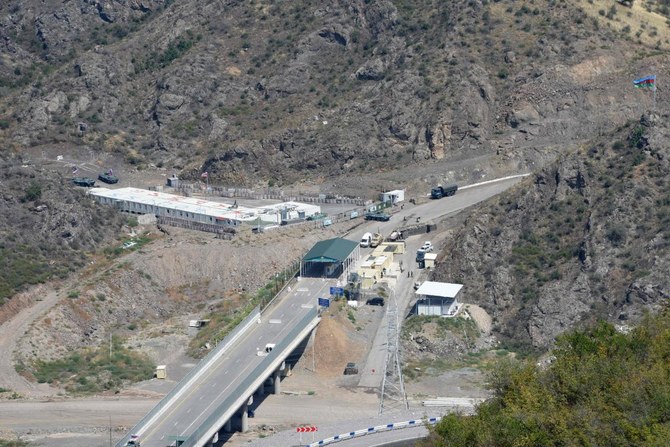YEREVAN: Four Armenian servicemen were killed and three Azerbaijani soldiers wounded on Friday, the two countries said, as they accused each other of engaging in a new round of clashes.
Tensions between Baku and Yerevan have escalated sharply in recent months, as both sides accuse the other of cross-border attacks.
“As a result of an Azerbaijani provocation, four servicemen were killed and one wounded on the Armenian side,” Armenia’s defense ministry said, after earlier reporting two were killed.
The ministry said earlier that Azerbaijan had fired at Armenian positions near the town of Sotk, less than ten kilometers (six miles) from the Azeri border.
Azerbaijan said two of its soldiers were injured by an Armenian drone strike in the region of Kalbajar, on the other side of the border, while another was injured in cross-border fire.
“We declare that all responsibility for the tension and its consequences lies with the military-political leadership of Armenia,” Baku’s defense ministry said.
Both sides regularly blame each other for starting the violence and both sides accuse the other of spreading disinformation.
The latest clashes mark another blow to achieving peace between the two ex-Soviet republics, which have for decades been locked in a bitter dispute over the region of Nagorno-Karabakh.
Yerevan and Baku have fought two wars for control over the region, which is internationally recognized as part of Azerbaijan but largely populated by ethnic Armenians.
Armenia has accused Azerbaijan of blocking food and aid supplies to Armenian-populated towns in Nagorno-Karabakh via the Lachin corridor, the sole road linking Armenia to the region.
Yerevan and international aid groups have warned the humanitarian situation in the mountainous region is dire and deteriorating, with shortages of food and medicine.
The two sides have been unable to reach a lasting peace settlement despite mediation efforts by the European Union, United States and Russia.
Four Armenian troops killed in clash with Azerbaijan
https://arab.news/phb6m
Four Armenian troops killed in clash with Azerbaijan

- Tensions between Baku and Yerevan have escalated sharply in recent months, as both sides accuse the other of cross-border attacks
- “As a result of an Azerbaijani provocation, four servicemen were killed and one wounded on the Armenian side,” Armenia’s defense ministry said
Bangladesh summons Myanmar envoy after border clashes

- A dozen villages in Bangladesh’s Cox’s Bazar district have been affected by the violence
DHAKA: Bangladesh on Tuesday summoned the ambassador of Myanmar after civil war gun battles in the neighboring country spilled over the border, wounding a Bangladeshi girl.
Heavy fighting in Myanmar’s Rakhine state this month has involved junta soldiers, Arakan Army fighters and Arakan Rohingya Salvation Army militia guerrillas.
Authorities said around a dozen villages in Bangladesh’s Cox’s Bazar district have been affected by the violence.
Twelve-year-old Huzaifa Afnan was struck by a bullet, while a Bangladeshi fisherman had his leg ripped off after stepping on a landmine near the frontier.
“Bangladesh reminded that the unprovoked firing towards Bangladesh is a blatant violation of international law and a hindrance to good neighborly relations,” a Foreign Ministry press statement said.
Myanmar’s ambassador to Bangladesh, U Kyaw Soe Moe, was summoned to the Foreign Ministry on Tuesday, where he expressed sincere sympathy to the injured victims and their families.
“My daughter was supposed to go to school, but she is on a ventilator,” Afnan’s father Jasim Uddin said. “My heart is bleeding for my baby girl.”
More than a million Rohingya have fled their homes in Myanmar, many after a 2017 military crackdown, and now eke out a living in sprawling refugee camps just across the border in Bangladesh.
ARSA, a Rohingya armed group formed to defend the persecuted Muslim minority, has been fighting the Myanmar military, as well as rival Arakan Army guerrillas.
On Monday, Bangladeshi border forces detained 53 ARSA fighters who had crossed the frontier.
Bangladeshi police officer Saiful Islam, commander of the local Teknaf station, said all detainees were being held in jail, except one fighter who was receiving hospital treatment for bullet wounds.
“These individuals have a history of living in the refugee camps in Cox’s Bazar and crossing into Myanmar,” Islam told AFP.














